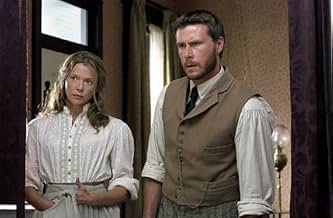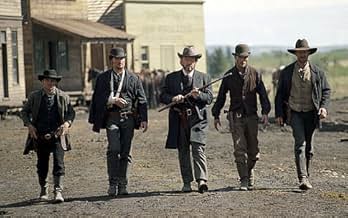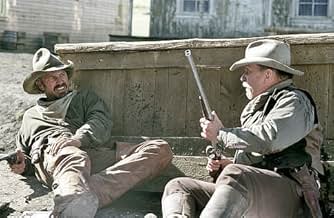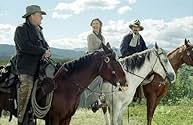Ein ehemaliger Revolverheld ist gezwungen, wieder zu den Waffen zu greifen, wenn er und seine Viehbesatzung von einem korrupten Gesetzeshüter bedroht werden.Ein ehemaliger Revolverheld ist gezwungen, wieder zu den Waffen zu greifen, wenn er und seine Viehbesatzung von einem korrupten Gesetzeshüter bedroht werden.Ein ehemaliger Revolverheld ist gezwungen, wieder zu den Waffen zu greifen, wenn er und seine Viehbesatzung von einem korrupten Gesetzeshüter bedroht werden.
- Regie
- Drehbuch
- Hauptbesetzung
- Auszeichnungen
- 1 Gewinn & 5 Nominierungen insgesamt
- Ralph's Wife
- (as Pat Stutz)
- Ballester
- (as Diego Del Mar)
Empfohlene Bewertungen
In the cowboys group we find an ex gunslinger(Kevin Costner), an old man (Robert Duvall) and a younger (Diego Luna). They'll have to fight against a landowner (Michael Gambon), a corrupt sheriff( James Russo), an assassin (Kim Coates), among others . Meanwhile the ex-gunfighter will fall in love with a spinster (Annette Bening).
The final showdown between the contenders is breathtaking, gunfight is likeness to "O.K. Corral duel¨.
The film is awesome , sets are extraordinaries and landscapes are wonderful.
The movie blends action, violence, a love story ,drama ,shootouts and is a fascinating film.
Direction by Kevin Costner is of first rate as ¨dancing with wolves¨. Cinematography by Michael Muro is glimmer and Michael Kamen's musical score is atmospheric. Runtime film is overlong however is neither tiring , nor boring but entertaining.
Rating: 7'5 /10 above average. Well worth watching.
It is perhaps a good thing that the unjustified criticism and media-driven-hatred of Kevin Costner is starting to subside, but we must be careful not to be too forgiving of him and too quick to heap praise on him. Open Range was greeted with rave reviews and hyped claims that it doesn't totally live up to - but it still manages to be an enjoyable and well made film. The film opens very weakly with an overly-wholesome feel and `aw-shucks' dialogue that continues for the first ten minutes. However after this the film gets better and settles down into more of an acceptable tone. The film is never really very dark, but it has a nice tension to it that runs even when the film is amusing.
If it has one major flaw it is that it is too slow to really be enjoyed by all. Even as someone used to the slow pace of many westerns, I found this to really try my patience at times. It is not so much the pace of the film as the feeling of it dragging. The actual pace works quite well for this film but it should have been edited a bit tighter to offset the drag - there are plenty of moments where it could have been trimmed to it's benefit, and the film could easily have lost 15 minutes. The slow pace helps in one regard - the final gunfight. When the standoff finally comes it is violent, long and very impacting. Some reviewers have complained about the lack of realism in the fight, but I actually think that the misses (although excessive) are more believable than scores of direct hits. The gunfight is all the more surprising for Charley's sudden return to character. His dark past is hinted at, but when it comes it comes with a thunder - the sound effects are tremendous, the first shot made me jump and the rest were just as loud.
Some issues are smudged: it is too hard to believe that Sue would be unmarried, Charley's descent is not that well done and both Mose and Buttons are poor characters - but it is easy to ignore these. The characters are not great but they are good enough for this. Duvall is the best thing in the film, his easy charm compliments the slow pace and he makes for nice slow-poke humour. Costner is as good, he is unassuming - not a great character but good enough for a western. Bening is good despite being given the romantic subplot to handle. Support is good from Gambon, the late Jeter and others in solid, if stereotypical roles. On a personal note it was good to see Kim Coates in a big screen movie.
Overall, this got big praise, but it will likely not covert anyone to be a western fan. As a genre film it is very enjoyable but it is hard to ignore the clichéd slow-motion, the overly slow pace and the indiscipline of the editing. However the film is enjoyable, funny, patient and, when it comes, brutally impacting.
Well, at least Kevin Costner must have a heart for the genre as he been involved with several major western productions in the last 15 years, this the latest.
The best thing I can say about this film right out front is that it may be the best western I've ever watched. I can't give it higher praise than that! Since I've seen so many, for so long, it's especially high praise.
I make this bold statement because of the following:
1 - Fantastic scenery and beautiful cinematography. If it looks spectacular on my 24-inch flat-screen, I can't imagine how awesome it would be a big plasma set.
2 - Characters you really care about, led by three actors who almost always give solid performances: Robert Duvall (the best in here), Costner and Annette Bening. Duvall, by the way, gives one of the best short "speeches" I've ever witnessed in a movie. It was nice to see Bening actually play a wholesome woman for a change. The two men who are out on the range with Duvall and Costner also were excellent.
3 - Just the right amount of action. When the action does occur, such as gunfire, the sound is incredible. This might be one of the best movies, audibly-speaking, I've ever heard, which is another reason for ranking it Number One. There are no lulls but not a ton of action, either.
4 - Just the right amount of romance. It doesn't get sappy, it doesn't overshadow the basic story, but it adds a nice, soft touch to what could be a very rough and unpleasant tale. And, in a different twist, it's the romance, not the usual climactic gun battle, that ends this film.
I can't say enough about this movie except that I'm sorry more westerns like it aren't made today.
In Open Range, Costner again has the lead: as Charley Waite, former gunfighter, now sharing ownership of a free grazing cattle drive. Together with Boss Spearman (Robert Duvall), and two others they reach Harmonville where they soon encounter a corrupt town Marshal (James Russo) and rancher (an excellent Michael Gambon) who threaten their way of life. They also discover others who prove sympathetic to their cause, like the sister of the town's doctor Sue Barlow (Annette Bening). There's growing suspense as an inevitable showdown looms ("Men are gonna get killed here today, Sue, and I'm gonna kill 'em...") Waite's personal life, and his romance gradually comes to the fore until its crisis, as well as the combat, mark the end of the film.
On screen Costner shares equal honours with the septuagenarian Robert Duvall, whose personal philosophy that "Man's got a right to protect his property and his life, and we ain't gonna let no rancher or his lawman take either," informs much of the main action. Crusty and fearsome, Spearman's dauntless words recall those of John Wayne's J.B. Books in The Shootist (1976) who expressed broadly similar sentiments: "I won't be wronged. I won't be insulted. I won't be laid a-hand on. I don't do these things to other people, and I require the same from them." In either case its an old man speaking, one fiercely independent after a life of hardship and who won't be trifled with. Open Range takes its main impetus from exactly that sort of unwelcome interference, and resembles Eastwood's Unforgiven in that a good deal of the narrative consists of a determined settling of accounts, an unrelieved search for moral recompense outside the law after an initial trespass against the innocent. What is started almost casually is finished deliberately and by the authority given the wronged: "Ours ain't writ by no tin star, bought and paid for, Marshall. It's writ by us, and we aim to enforce it," says Boss. Like Eastwood's film, Open Range also features a retired gunman who has recourse to his skills to help salvage a situation, and some of the best scenes with Costner's character concern his dispassionate and professional preparation for gunplay. Like William Munny before, Charley Waite has something of an avenging angel about him, whose cold consideration of his trade is filmed completely without irony.
Open Range has all the hallmarks of Costner the western auteur: an expansive, almost leisurely tone, supporting roles for loyal canines, a certain solemnity and respect for his conservative cinematic predecessors being foremost amongst them. As others have said, Costner directs as if Peckinpah and Leone had never existed, and the present work is no exception. Characteristically, it contains none of the self-indulgent nostalgia or cynicism common in the genre since the 1960s. Despite a visual quote from The Wild Bunch (1969) for instance, as men take their long walk abreast to the confrontation, the final shootout of Open Range owes far more to the traditional showdown of Gunfight At The OK Corral (1957) than the apocalyptic finale of Peckinpah's masterpiece. Slow burning, character driven and ruminative, Costner's latest has been criticised by some for its too-deliberate narrative pacing. For an MTV-generation viewing audience, unused to an older, more leisurely way of showing things, such issues are understandable, although no one used to a filmmaker taking his time to tell a good story will complain. Indeed, part of the great success of Open Range is the way it single-mindedly sustains an atmosphere of fateful suspense.
One thing that no one disputes: Duvall is magnificent in his part, a performance that may well prove a capstone to a long and prestigious career. Costner apparently had the actor in mind for the part from the first, a decision justified entirely and one of the highlights of the film. In fact if the film's has a weakness it can be put down to that fact that Spearman holds the stage so successfully, and for so long. Waite's own romance, starting so tentatively, is somewhat overshadowed by the more urgent prerogatives of his partner and when it finally flowers, it leads to some scenes which could have, with prudence been cut back to greater effect. Having said that, Costner's awkward farewell to Miss Barlow, saying so much with so little, just before the fight begins, is another memorable scene where sentimentality is kept happily at bay. It is once the violence is over, and the great tension is dissipated, that matters are drawn out a little too much. A little stoicism might have led to a more memorable close.
Like many good westerns, Open Range's central concerns lie around personal freedom and moral rectitude - the balance between which gives a good deal of the narrative its necessary tension. Like crossing the flood, which pours down the main street of Harmonville, the participants have to choose one side or the other. It's a film ultimately less about a gunfighter settling down, than of how men abide their self-justified actions. In the disc extras, Costner draws an illuminating parallel between the scene in his film in which Spearman and Waite confront the jayhawkers and The Oxbow Incident. In Wellman's 1943 classic, a rushed lynching leads to a disastrous error and mutual guilt. In Costner's film, to whom guilt is assigned is never in doubt, and indeed Spearman initially has to hold Waite back from overstepping the mark - an action which he comes to regret. "I never had any problem with killing," says Waite at one point. Like Eastwood's Munny, once justified he seeks stark retribution without compunction.
There's only one gunfight in Open Range, but it is worth the wait. Spread out almost as leisurely as the rest of the film, Costner and his cinematographer James Muro use a range of shots throughout the violent events to achieve effects both chaotic and planned at the same time. (Incidentally for a filmmaker who prides himself on accuracy, Costner has his hero 'fan' off shots, a notoriously inaccurate way of discharging a gun, but that's a minor distraction.) It's a notable confrontation, an extended set piece sequence that is one of the director's best and confirms his film the finest western since Unforgiven.
Wusstest du schon
- WissenswertesOriginally, Touchstone Pictures had Kevin Costner top-billed over Robert Duvall, but Costner asked the studio to top-bill Duvall instead.
- PatzerCharlie fires 16-17 rapid fires shots from one single-action, six-shot revolver - without reloading. In fact, during the first volley, he fires four random shots and then actually "fans" the revolver and fires ten additional shots into a bad-guy gunslinger in less than seven seconds, without changing weapons or re-loading. And then fires a few more rounds at still standing gun-men. Costner admitted in an interview for this film that he has always wanted to film a scene where he fans a six-gun way over the realistic amount of shots, and that this scene was indeed very enjoyable to make.
- Zitate
Sue Barlow: I don't have the answers, Charley. But I know that people get confused in this life about what they want, and what they've done, and what they think they should've because of it. Everything they think they are or did, takes hold so hard that it won't let them see what they can be.
- Alternative VersionenAMC version severely edits Butler's death. The sound of the gunshot that kills him is played at a lower volume, and the scenes of him falling back is sped up, so as to avoid showing the hole in his head from the shot.
- SoundtracksHolding All My Love for You
Written by Michael Kamen (BMI) and Julianna Raye (BMI)
Performed by Julianna Raye
Produced by James Harrah
(P) (C) K-Man Corp. (BMI) / Ziffy Music, Inc. (BMI) / Open Range Productions USA, Inc. (BMI)
Top-Auswahl
- How long is Open Range?Powered by Alexa
Details
Box Office
- Budget
- 22.000.000 $ (geschätzt)
- Bruttoertrag in den USA und Kanada
- 58.331.254 $
- Eröffnungswochenende in den USA und in Kanada
- 14.047.781 $
- 17. Aug. 2003
- Weltweiter Bruttoertrag
- 68.296.293 $
- Laufzeit2 Stunden 19 Minuten
- Farbe
- Sound-Mix
- Seitenverhältnis
- 2.35 : 1
Zu dieser Seite beitragen




































